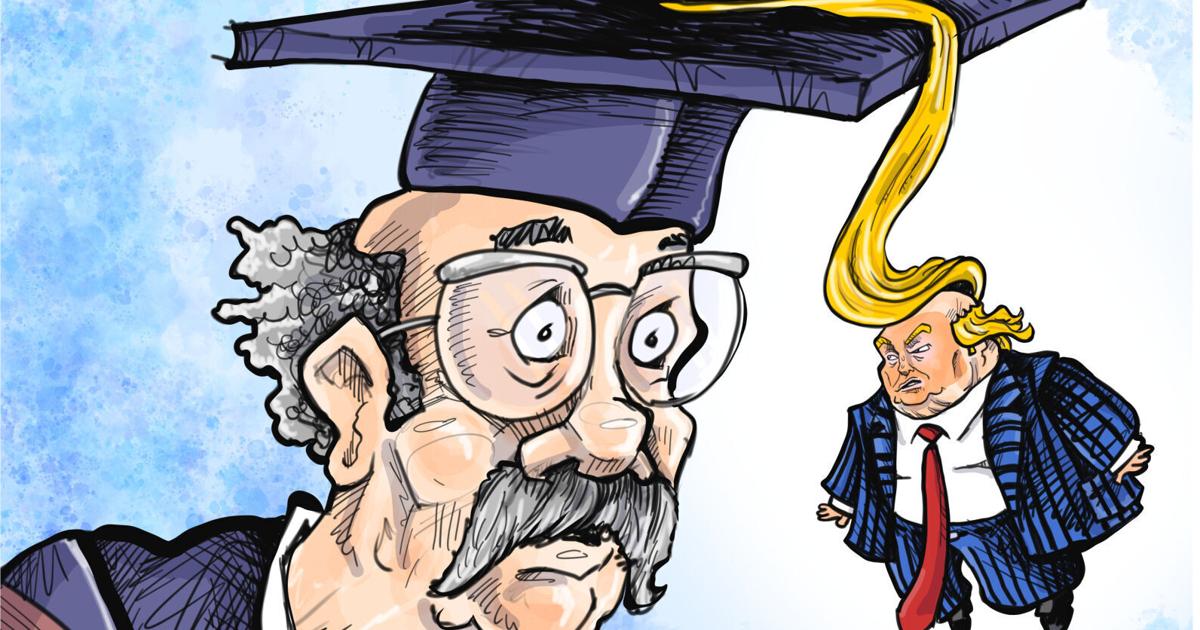Politics
Trump’s Proposed Federal Compact Threatens Higher Education Landscape

President Donald Trump has initiated a controversial push to compel some of the United States’ leading universities to sign a sweeping federal “compact.” This move, which critics argue may undermine academic freedom and governance, follows a series of contentious policies from his administration, including pardons for individuals involved in the January 6 insurrection.
Trump’s proposed compact aims to enforce specific ideological standards and compliance with federal guidelines, raising significant concerns among educators and administrators. Critics, including former political reporter James Rosen, argue that this approach could cripple the autonomy of institutions that are foundational to American higher education.
Concerns Over Academic Freedom
The implications of Trump’s demands extend beyond mere compliance. Many university leaders fear that signing such a compact could lead to a chilling effect on academic inquiry and discourse. Institutions that have long prided themselves on fostering open debates and diverse viewpoints may find themselves constrained by federal regulations dictating their policies and practices.
Rosen, writing for InsideSources.com, emphasizes the potential risks associated with this initiative. He asserts that the compact could tilt the educational landscape towards a more homogenized set of beliefs, stifling innovation and critical thought.
The stakes are particularly high for universities that receive federal funding, which has become a lifeline for many institutions facing financial difficulties. The prospect of losing such support could pressure them into compliance, thereby eroding their independence.
Impacts on Students and Faculty
The proposed compact has raised alarm bells not only among university administrators but also among students and faculty members. Many educators worry that the compact could impose restrictions on curriculum and research, limiting their ability to explore controversial or progressive topics.
As institutions navigate these challenges, the broader implications for the educational system could be profound. Students may find their academic experiences transformed, as universities may prioritize adherence to federal guidelines over the principles of academic freedom.
Critics argue that such a shift could negatively impact the quality of education, as courses and programs may be altered to align with political objectives rather than scholarly rigor. This concern is especially pertinent in a climate where social issues and scientific inquiry are increasingly under scrutiny.
In conclusion, the push for a federal compact by President Trump represents a significant challenge to the autonomy of American universities. As these institutions confront the possibility of new federal regulations, the consequences for academic freedom, student experiences, and the overall landscape of higher education remain to be seen. The debate surrounding this initiative will likely intensify as stakeholders assess its potential ramifications.
-

 Politics1 week ago
Politics1 week agoDallin H. Oaks Assumes Leadership of Latter-day Saints Church
-

 Sports1 week ago
Sports1 week agoSteve Kerr Supports Jonathan Kuminga After Ejection in Preseason Game
-

 Lifestyle1 week ago
Lifestyle1 week agoDua Lipa Celebrates Passing GCSE Spanish During World Tour
-

 Business1 week ago
Business1 week agoTyler Technologies Set to Reveal Q3 2025 Earnings on October 22
-

 Entertainment1 week ago
Entertainment1 week agoZoe Saldana Advocates for James Cameron’s Avatar Documentary
-

 World1 week ago
World1 week agoD’Angelo, Iconic R&B Singer, Dies at 51 After Cancer Battle
-

 Science1 week ago
Science1 week agoChicago’s Viral ‘Rat Hole’ Likely Created by Squirrel, Study Reveals
-

 Lifestyle1 week ago
Lifestyle1 week agoKelsea Ballerini Launches ‘Burn the Baggage’ Candle with Ranger Station
-

 Health1 week ago
Health1 week agoRichard Feldman Urges Ban on Menthol in Cigarettes and Vapes
-

 Health1 week ago
Health1 week agoCommunity Unites for Seventh Annual Mental Health Awareness Walk
-

 Business1 week ago
Business1 week agoMega Millions Jackpot Reaches $600 Million Ahead of Drawings
-

 Business1 week ago
Business1 week agoMLB Qualifying Offer Jumps to $22.02 Million for 2024







